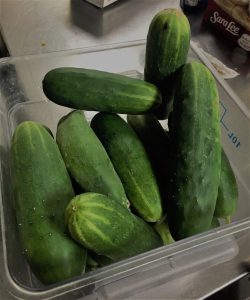If you are a produce farmer, you should have heard about the Food Safety Modernization Act, or FSMA, by now. This act, which was passed in 2011, is considered the largest update to food safety regulation in over 80 years.
The proposed produce safety rule under the FSMA is very robust, establishing the minimum standards for worker training, health and hygiene, agricultural water use, animal soil amendments, on-farm domesticated and wild animals, equipment, tools, buildings, and sprout production. But just who does the new food safety rule affect?
First, the rule does not apply to produce that is not a raw agricultural commodity, or commodities the Food and Drug Administration (FDA) has identified as “rarely consumed raw.” Secondly, if your farm has an average value of produce sold of $25,000 or less within the previous three years, you are also exempt.

Fresh cucumbers, for example, are considered a raw commodity. But cucumbers that will undergo further processing, such as for pickling, would be eligible for exemption from the produce rule. Photo by Molly Jameson.
If you do produce an agricultural commodity in which the rule applies, and the value of your produce sold is over $25,000, it is still possible that your farm might be exempt from most of the requirements. For instance, if the average annual monetary value of food sold directly to qualified end-users was more than the average annual value of the food sold to all other buyers within the previous three-year period, you meet the first half of exemption eligibility. A “qualified end-user” is considered the consumer of the food, or restaurant or retail food establishment, located within the same state as the farm that produced the food (or no more than 275 miles).
If you meet the above exemption eligibility standards, you must also meet the second requirement. That is, the average annual monetary value of all food sold during the three-year period must be less than $500,000, when adjusted for inflation.
Not sure if you are exempt? View the chart developed by the FDA: Standards for Produce Safety – Coverage and Exemptions/Exclusions for Proposed 21 PART 112.
Whether you will be exempt from the FSMA produce safety rule or not, it is always a good idea to follow good agricultural practices and to have a farm food safety plan. To learn more about food safety on the farm, view the University of Florida IFAS document Food Safety on the Farm: An Overview of Good Agricultural Practices.
The UF/IFAS Small Farms Academy is offering a Building Your Own Farm’s Food Safety Manual Workshop in Tallahassee to help growers develop their own food safety manuals. This workshop is tailored to fresh fruit and vegetable farms, fields, or greenhouses, and is partially supported by a grant through the Florida Specialty Crops Block Grant program from the Florida Department of Agriculture and Consumer Services.
The registration fee is $35 for the first person representing a farm, and $15 for an additional attendee from that farm. The workshop is limited to 20 farms on a first come, first serve basis.
The workshop will take place at the Amtrak Station, County Community Room, 918 Railroad Ave, in Tallahassee, FL, on Tuesday, May 23, 8:00 a.m. to 4:00 p.m. Register on Eventbrite by following this link: https://farmfoodsafetymanualworkshop.eventbrite.com
Please note, this class will help you develop your farm’s food safety manual, but it does NOT fulfill the new FDA FSMA one-time training requirement.
- Choosing the Right Sales Model for Your Small Farm - July 31, 2025
- Specialty Peppers for Every Heat Level - January 31, 2025
- Understanding Short-Day vs. Long-Day Onions - July 26, 2024
